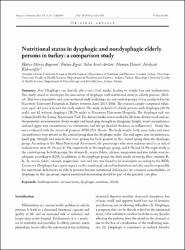Nutritional status in dysphagic and nondysphagic elderly persons in Turkey: A comparison study
Özet
Aim: Dysphagia can directly affect one’s food intake, leading to weight loss and malnutrition.
This study aimed to investigate the association of dysphagia with nutritional status in elderly persons. Methods: This was a descriptive and cross-sectional study including case and control groups. It was conducted in the
Hacettepe University Hospitals in Turkey between April 2015-2016. The research sample comprised volunteers aged >65years who met the study criteria. The study included 55 elderly persons with dysphagia (49.1%
male) and 62 without dysphagia (38.7% male) in Hacettepe University Hospitals. The dysphagia risk was
evaluated with the Eating Assessment Tool. The dietary intake was recorded by 24-hour dietary recall and anthropometric measurements (body weight and hand-grip strength in kilograms; height, waist circumference
and mid upper arm circumference in centimeters; and triceps skinfold thickness in millimeters). Study data
were evaluated with the statistical program SPSS 23.0. Results: The body weight, body mass index and waist
circumference were greater in the control group than the dysphagic males. The mid upper arm circumference,
hand-grip strength and muscle area were greater for both genders in the control group than the dysphagic
group. According to the Mini Nutritional Assessment, the percentages who were malnourished or at risk of
malnutrition were 49.1% and 45.4%, respectively in the dysphagic group, and 9.7% and 41.9% respectively in
the control group. In both groups, the vitamin B1, niacin, folate, calcium, magnesium and zinc intake were inadequate according to RDA. In addition, in the dysphagic group, the daily intake of energy, fiber, vitamins B1,
B2, B6, niacin, folate, calcium, magnesium, iron and zinc was found to be inadequate according to the RDA.
Conclusion: Dysphagia has a great impact on the nutritional risk and malnutrition and also may be responsible
for nutritional deficiencies in elderly persons because nutritional deficiencies are common comorbidities of
dysphagia in this age group, regular nutritional monitoring should be part of the geriatric care plan.
Cilt
23Sayı
1Bağlantı
https://hdl.handle.net/11363/4955Koleksiyonlar
Aşağıdaki lisans dosyası bu öğe ile ilişkilidir:


















